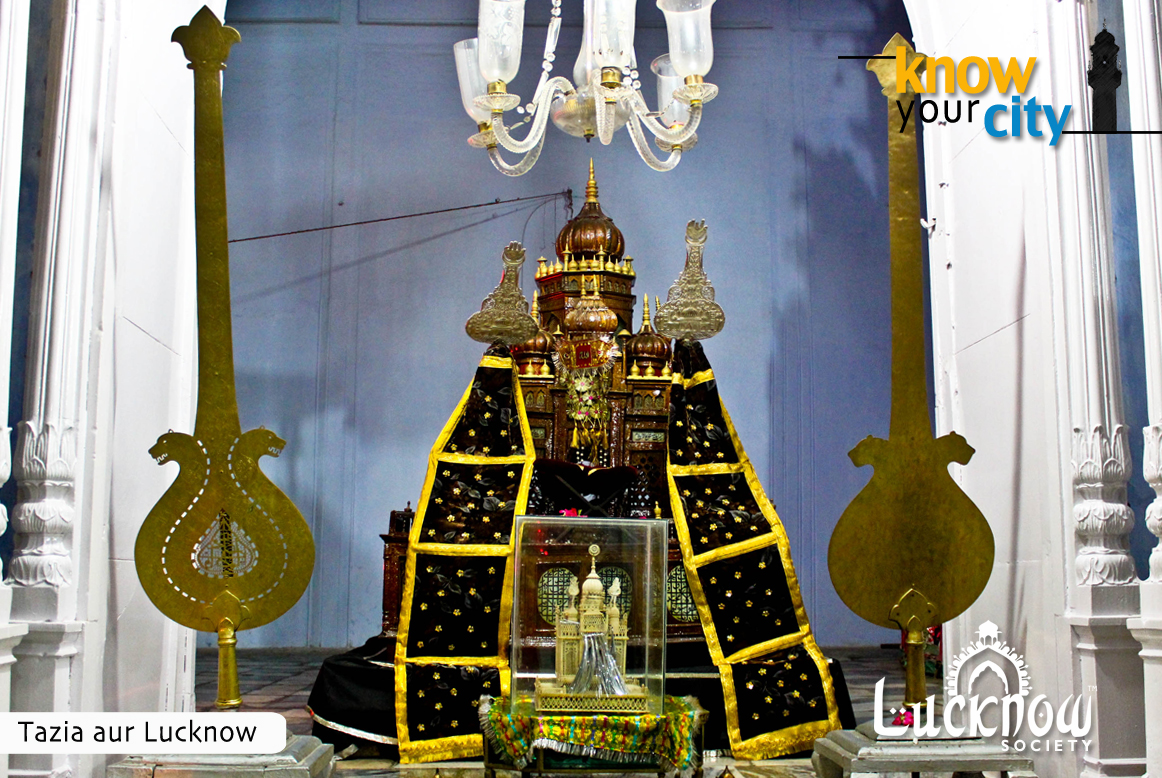Tazia aur Lucknow
“Hamara Aapka Har Shaks Ka Gham Eik Jaisa Hai,
Khushi Sab Ki Alag Hai Sab Ka Maatam Eik Jaisa Hai”- Kamal Haatvi
Originally the word tazia is a derivative of word taziat meaning condolence. It also relates to taziat which means consoling the relatives who have suffered from a tragedy. Month of Moharrum marks mourning of Hazrat Imam Hussain ( A.S.), the grandson of Prophet Muhammed ( Peace Be upon Him). He sacrificed himself and his family, friends including his 6 months old son. His fight was for truth against injustice and he refused to bow down before tyranny. The history of taziadari or keeping tazia is traced back to the period of Timur who invaded India in 1398 AD. The need for a tazia arose when Timur, who was involved in consolidating his hold on the invaded territory, could not take his army on their annual trip to Karbala so he got a model of the shrine built. He built the first ever tazia and it was supposed to have been plastered with Khaak-e Shifa, the clay from Karbala, which he got specially transported all the way to India. It became popular with the Mughals and spread to other regional dynasties also. Nawabs of Awadh brought it to such perfection that they made tazia of Lucknow a unique symbol of sacrifice. They raised its standard to such a degree that tazia of Lucknow became accomplished across Indian subcontinent. Lucknow is famous for the exquisitely designed tazias. Lucknow School of Poetry has also produced some of the best poetry of Marsiya, Soz, Noha, Rajaz, Salaam, etc focused on various aspects of the battle of Karbala.
No country other than India, has the versatile and varied nature of making Tazia and Lucknow is the pioneer in the same. Its making involves workers from almost all communities and religions. While the small tazias are carried in arms, the tall ones, some of them going up to 50 feet, or even more are wheeled in processions. There are three types of tazias, first being silver or metallic, second is wooden and third is made of paper-bamboo. Tazias made of paper and bamboo are for one time use and buried under the soil, but many of wood-crafted tazias are of permanent nature and some of them are more than a century old. These tazias are not buried but are covered after the procession is over on 10th of Moharram and are returned to their respective places for next year’s rituals. Lucknow is a prominent place where tazias are taken out with devotion in remembrance of Hazrat Imam Hussain ( A.S. ).
“Markaz-e Alam Kehye Ya Maqaam-e Gham Kehye,
Dil Magar Behelta Hai Karbala Ke Daaman Mein” – Nirmal Darshan
Credit : Intern – Nishita Banerji

